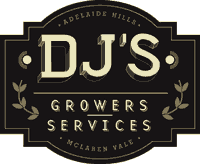As we grow as a business, DJ's Growers is very conscious of the footprint that is left behind by both us and our clients.
We aim to:
*Increase the uptake of composts, mulches and organic fertilisers (particularly our DJ's Product range) with our clients to improve soil. While sales of products will help with gauging uptake, yield and quality data will be the ultimate guide of success.
In the early 2000’s, after a visit from Dr. Clifford Ohmart, who had developed California’s first ever third party certified sustainable winegrowing program, the Lodi Rules, the innovative winegrowers of the McLaren Vale were inspired to develop their own version of a sustainability program, which would, ‘improve viticultural practices, fruit quality and the financial viability of the region’. Led by local winegrower and academic, James Hook, many of McLaren Vale winegrowers initiated a series of informal seminars and workshops to help improve viticultural practices. They started a growers bulletin called Crop Watch, that provides, amongst other things, information from nine weather monitoring stations throughout the region, as well as pest and disease alerts. They also wrote a number of grower-endorsed codes of conduct on subjects such as soil and water management, pest and disease controls, and economic benchmarks.
*Support and encourage our clients with reporting their sustainability benchmarks. Increased uptake of programs such as Sustainable Australia Winegrowing amongst our clients, and the achievements made when compared to previous data will show if this is successful.
Recorded on the last day of summer, this vineyard we look at early autumn leaf loss and ripening with Gill Gordon Smith.
How important is post harvest irrigation and fertiliser?
*Continue to champion integrated pest management (IPM). While starting to become more commonplace, IPM is still seen as being difficult to manage and not achievable in many situations. By continuing to train our staff in IPM principles, insect identification, and the effect of insecticides on beneficial species we can make sure that we are advising the use of chemical options in a continually responsible manner. By speaking to grower groups, and spreading the message of IPM amongst agronomy and agricultural retail peers, we can help continue to make IPM more accepted in the general grower community.
*Continue to support local biodiversity and re-vegetation groups. Increasing areas of re-vegetation and decreased problem weeds will be the ultimate measure of success, as will the longevity of these groups that can only exist with support from local volunteers and business support.
The first Homeless Grapes Project started in 2015 with one little Facebook post. Jock Harvey, from Chalk Hill Wines, posted that he had a surplus block of grapes and anyone was welcome to them if they made a donation to charity.
*Continue to support the Homeless Grapes Project which donates grapes, grape picking and winemaking to raise money for the Hutt Street Centre.

